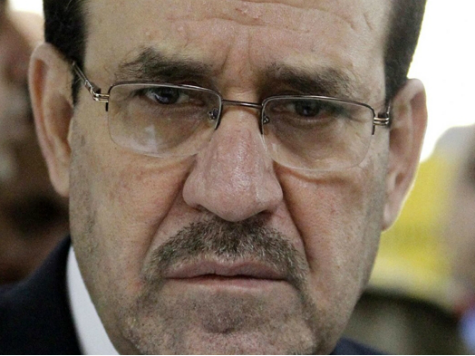Although President Obama personally requested in his most recent Rose Garden speech that Iraqi PM Maliki reach out to his Sunni counterparts, it appears Obama’s wish has fallen upon deaf ears. Maliki has in fact done the exact opposite, as he reportedly fired four top Sunni officials because they “failed to fulfill their professional and military duties.”
Maliki also announced he would be cracking down on politicians and military officers that he considered to be “traitors.”
Maliki pointed his finger directly at the Saudis, accusing them of financing jihadist group ISIS. An Iraqi government official told Reuters, “We hold them responsible for supporting these groups financially and morally, and for the outcome of that – which includes crimes that may qualify as genocide: the spilling of Iraqi blood, the destruction of Iraqi state institutions and historic and religious sites.”
The Saudi government also reportedly threatened the Iranians, telling the Shia Islamic Republic not to get involved in Iraq’s internal clashes. The Saudis also placed blame on Prime Minister Maliki, saying Iraq’s problems are largely due to years of “sectarian and exclusionary policies” by the Shia-led government against Iraq’s Sunni population.
Iranian President Hassan Rouhani said Wednesday that Iran will, if necessary, defend Iraq’s Shia Muslim population from “killers and terrorists.” A report Tuesday said some 5,000 Iranians have pledged to respond to Rouhani’s call for defending Iraq’s Shia holy sites.
Meanwhile, the Iraqi government has continued to largely shut down internet and social media platforms. What was once a ban in a few different provinces has now turned into a shutdown of private networks and mobile phone data. Some argue the media shutdown is occurring in an effort by the Iraqi government to shut down ISIS’s communication abilities. Many worry the jihadi group’s public diplomacy has enabled it to garner further support among Iraqis and the international community. The jihadist group has consistently broadcast images of mass executions and beheadings.
In a surprising statement this week, a Turkish government representative told a Kurdish media station that Turkey accepts the Kurdish peoples’ right to sovereignty and self-determination. “The Kurds of Iraq can decide for themselves the name and type of the entity they are living in,” said a ruling party spokesman. This marks a significant shift in policy priorities for the former Ottoman Empire headquarters. Although the Kurds have been largely autonomous since 1991, Turkey has since been opposed to their official recognition as a sovereign entity.

COMMENTS
Please let us know if you're having issues with commenting.